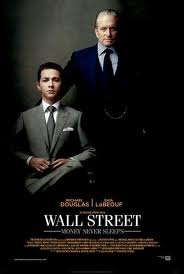I liked this movie. Michael Douglas is at the top of his game: creepy, smart, likable, predictably unpredictable as slithery, unrepentant Gordon Gekko. I even like Shia LeBeouf. This current generation of 20 year olds adores him, and I sort of understand it–way more than I understand their fascination with Michael Cera.
The movie didn’t break any new ground. But it did portray the interesting tensions between the need to make money, the desire to make lots of money, the honor in work that pays enough but not lavishly, and the seduction of astronomical amounts of money, of MORE money, without end or purpose except in itself. These tensions are much in the collective consciousness right now.
One friend claims that derivatives trading is the root of the current economic wobbling. She’s a smart lady, so I tend to think carefully about what she says. “Nothing is created,” she says.
But I’m not sure it’s as simple as what is or isn’t created. Take pharmaceutical companies. They create things. They create drugs. And then they lie about their test results, test illegally on unwitting people in 3rd world countries, and go to extreme and slimy lengths to get their drugs approved by the FDA and to knock out the competition. Take the CODEX initiatives, sponsored by pharmaceutical companies.
Those initiatives are strangling Europe’s rights to buy vitamins, minerals, and supplements, initiatives which will surely sweep over the US because so many Americans are unthinking sheep who think that as long as we have a president of color, we will be okay. In fact, Obama is in bed with Monsanto–check out the way Secretary Tom Vilsack jetted around in Monsanto’s private jets. The point is: big pharma talks a good game, but what they really want is to prevent people from healing and treating themselves with vitamins. That might cut into big pharma’s profit$.
Is there any business more corrupt than big pharma? Other than big government? Americans have bought the line that “the business of America is business,” and, in so doing, they have set themselves up to be screwed. Because the government is big business, big pharma is big business, and they care more about their own agenda$ than about the welfare of human beings. The FDA, often staffed by scientists on temporary leave from their employers the pharmaceutical companies, is nothing but a shill for the chemical, pharmaceutical, biotech, and medical establishment companies.
But I digress. Back to the movie. Which is about the corruption rampant within business, even within ‘good people.’ It was a sweet notion that cold fusion might be possible and the evil empire shut it down because of that very real possibility.
I keep thinking about Martin Seligman’s work with positive psychology, and his notes on living a life of meaningful purpose, based on doing something we’re good at. But does that really mean that Susan Sarandon’s character has to give up her dream of affluence and return to nursing? Even though it’s an absolutely crucial field of work, and her character is obviously a wonderfully people-oriented soul.
Why have we as a culture given more monetary value to things like stockbroking and real estate than to nursing?
I know, I know, we can’t live without water, and diamonds cost more.
So is it human nature to devalue what we need, and to obscenely over-value what is essentially frivolous?
All questions provoked by the movie.


